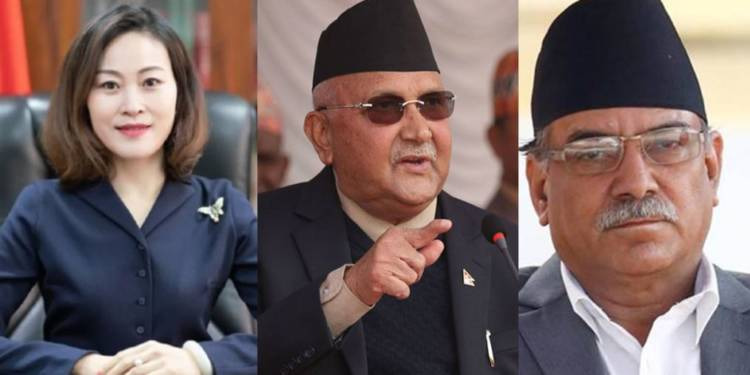The Chinese Ambassador to Nepal Hou Yanqi has done it again. She has once again crossed the line that distinguishes a diplomat from a local politician. The high-profile and extremely controversial envoy has been saving KP Sharma Oli, Nepal’s Prime Minister from getting unseated again and again. Every time, the ruling Nepal Communist Party faces the threat of an imminent split, Yanqi jumps in to save the day for Oli.
Hou Yanqi has once again stitched a truce between the warring faction of the ruling Nepal Communist Party led by Prime Minister Oli and former Prime Minister of Nepal, Prachanda. As per some claims, Oli is close to striking a deal with his main rival- Pushpa Kamal Dahal, who is also known as Prachanda.
Yet some other reports from Nepal claim that Dahal has ruled out an early convention of the party, saying that there are “various issues” which are yet to be ironed out.
The breakup of the Nepal Communist Party was around the corner, and Prime Minister Oli had started alleging that India was conspiring to topple him. Of course, the issues of Nepal are internal, and neither Oli nor Prachanda have any love lost for India. Oli’s remarks were a mere eyewash.
Anyway, Yanqi and Oli found themselves on the same page all over again. Throughout the ongoing month, Hou Yanqi has been in action. She has been exercising way too much of influence for a diplomat in Kathmandu’s power corridors.
The Chinese Ambassador has been meeting and counselling a number of Nepal Communist Party leaders including PM Oli himself, his adversaries- Prachanda and Madhav Kumar Nepal, and the Nepalese President Bidhya Devi Bhandari. All her meetings are based on a single agenda- “Party must not break, doesn’t matter whoever the PM, removing Oli will send signals Indian won.”
And we have lost the count. We don’t know how many times Oli was about to lose his chair, and Yanqi saved him. It was reported for the first time in May. Neither the story nor its characters were different. Disputes had arisen in the Nepal Communist Party. Madhav Kumar Nepal and Prachanda started speaking up against Oli openly. But Hou Yanqi ensured that Nepal’s Communists and Maoists stayed together.
When Oli felt too uncomfortable with the fissures within his party, Hou Yanqi came up with a plan for him. Oli started whipping up the anti-India sentiment and ratcheting irredentism. Facing internal troubles, Oli wanted to create emotive border issues out of thin air. Therefore, Nepal started staking the claim on the Indian territories- Lipulekh, Kalapani and Limpiyadhura out of the blue.
The Nepalese Communists suddenly started speaking about the Greater Nepal Project at the cost of historic ties with India. Revised political maps were incorporated in the Nepalese Constitution with a clear attempt to artificially enlarge Nepal’s territorial claims.
The Oli regime was making all the noise, but the script was actually written by the Chinese Embassy led by Hou Yanqi.
The Chinese interference in Nepal’s political affairs is amongst the grossest violations of the diplomatic code of conduct. And Beijing is not even trying to keep it under the wraps. When the Nepalese media asked the Chinese embassy spokesperson about the objective of Hou Yanqi’s meetings, the spokesperson almost made it clear that Beijing wants a puppet regime in Nepal.
The Chinese embassy spokesperson has said that Yanqi “didn’t wish to see the NCP in trouble and wished its leaders would resolve their difference and stay united.” And guess what Nepal’s Communist regime might have just complied for the being time.
The Chinese Ambassador seems to be the most influential person in the Himalayan, land-locked country. Hou Yanqi has emerged as one of China’s most undiplomatic wolf-warriors and even the local Nepalese media has questioned the extra-ordinary role of Beijing’s envoy. Nepal is thus fast becoming the living symbol of Chinese neo-colonialism.
